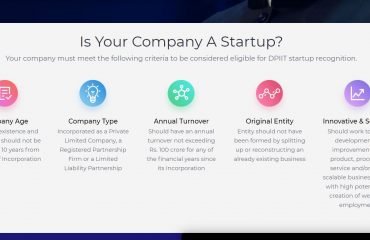Simplification & Handholding
- Compliance regime based on self-certification: The idea is to reduce the regulatory burden on startups, so that they can focus on their core business and keep the cost of compliance low. The regulatory regimes will thus be made simpler and flexible; inspections more meaningful and simple.
- Startup India Hub: Creation of a single point of contact for the entire startup ecosystem to enable the exchange of knowledge and access of funding. The Government will be the main stakeholder and will collaborate with Central and State Governments, Indian and foreign VC’s, angel networks, banks, incubators, legal partners, consultants, universities and R&D institutions.
- Rolling Out of Mobile App and Portal: It will act as an interacting platform for startups with the Government and regulatory institutions. This will be made available from 1st April, 2016 on all leading mobile/ smart device platforms.
- Legal Support and Fast: Tracking Patent Examination at Lower Costs- To promote and create awareness in startups about IPRs and ensure continuous growth and development of new startups, this scheme will make the task of filing patents easier.
- Relaxed norms of Public Procurement for Startups: The aim is to provide equal opportunity to Startups as compared to experienced companies. The Government will exempt startups from the criteria of ‘Prior experience/ Turnover’ in case of tenders floated by Government or by PSU’s, without relaxation in the quality parameters.
- Faster Exit for Startups: The Action Plan will make it easier for Startups to wind up operations in case they fail to succeed. An insolvency professional will be provided to the Startups, who will be in-charge of the company for liquidating the assets and paying the creditors in six months time. This process will accept the concept of limited liability.
Funding support & Incentives
- Provide funding support to startups: The Government will set up an initial fund of Rs.2,500 crore per year and a total of Rs.10,000 crore over a period of 4 years
- Credit Guarantee for Startups: To encourage Banks and other Lenders to provide Venture Debts to startups, Credit guarantee mechanism through National Credit Guarantee Trust Company (NCGTC)/ SIDBI is being considered with a budget of Rs.500 crore per year for the next four years.
- Tax Exemptions on Capital Gains: To promote investments into Startups, the Government will give tax exemption to those who have capital gains during the year and have invested such capital gains in the Fund of Funds recognized by the Government.
- Tax Exemption to Startups for Three Years: To address the working capital requirement, stimulate the development of Startups in India and provide them a competitive platform, the profits of Startups will be exempted from Tax for a period of 3 years.
- Tax Exemption on Investments over Fair Market Value: Investment by incubators in Startups will be exempted from Tax.
Industry – Academia Partnership & Incubation
- Organizing Startup Fests for Showcasing Innovation and Providing a Collaboration Platform: To strengthen the Startup ecosystem in India, the Government has proposed to introduce Startup fests at both national and international levels. This will be a platform for the Startups in India, to showcase their work and ideas and work with a larger audience comprising of potential investors, mentors and fellow Startups.
- Launch of Atal Innovation Mission (AIM) With Self Employment and Talent Utilization (SETU) Program: This will serve as a platform for promoting world- class innovation hubs, grand Challenges, Startup businesses and other self employment activities particularly in technology driven areas.
- Harnessing Private Sector Expertise for Incubator Setup: Government will create a policy and framework for setting up incubators across the country in public private partnership.
- Building Innovation Centers at National Institutes: To increase the incubation and R&D efforts in the country, Government will set up 31 centers of innovation and entrepreneurship at national institutes. For 13 centers an annual funding of Rs.50 Lakhs will be provided for 3 years to encourage student driven Startups.
- Setting Up of 7 New Research Parks Modeled on the Research Park Set Up at IIT Madras: In order to give a push to successful innovation through incubation and joint R&D efforts between academia and industry, the Government will set up 7 new Research Parks in institutes with an initial investment of Rs.100 crore each. The Research Parks shall be modeled based on the Research Park setup at IIT Madras.
- Promoting Startups in the Biotechnology Sector: The Biotechnology sector in India is on a strong, growth trajectory. Department of Biotechnology endeavors to scale up the number of Startups in the sector by nurturing approximately 300-500 new Startups each year to have around 2000 Startups by 2020.
- Launching of Innovation Focused Programs for Students: The Government will promote research and innovation among young students and has thus launched a few programs like- Innovation Core, NIDHI (a grand challenge program) and Uchhatar Avishkar Yojna. These schemes will initially apply to IIT’s only and each project may amount Rs.5 crore.
- Annual Incubator Grand Challenge: Incubators play an important role in identifying early stage Startups and supporting them across various phases of their lifecycle to build an effective Startup ecosystem. The Government is proposing to make forward looking investments towards building world class incubators in its first phase; the aim is to establish 10 such incubators. The Government will hence identify 10 incubators having the potential to become world class. These will be given Rs.10 crore each as financial assistance and such incubators will become reference models for other incubators. These will then be showcased on Startup India Portal. An Incubator Grand Challenge exercise will be carried out for the identification of such incubators and this will be an annual exercise.

